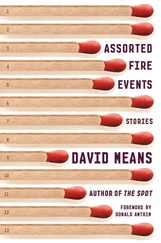Then the nurse said, “Oh, you poor little boy. We’re a long way off from Christmas. But we’re not a long way off from finishing the test. You’re a brave boy. A brave, brave boy.”
Woe to the man whose child is on the verge of a diagnosis, her face then seemed to say as she ran her fingers along the tape, removed the electrode wires, cleaned Gunner’s arm with a gauze pad, secured the collecting device, checked the tubing, and then, without another word, heaved out of the chamber, latched the door, tested the seal, and glanced back through the oval window with a face that said: I understand that your game with the toys in the bag was creative and a sign that you’re a good father, if somewhat desperate, and then she was gone and he turned to Gunner and said, “Daddy got in trouble because you were crying. Daddy got scolded, not verbally, but facially, so let’s pretend again, and do the Christmas grab bag, but do it right this time and really pretend I’m Santa.” And he opened the bag and pulled out his trump card, a toy he had left out in the first rotation, one of Gunner’s all-time favorites, Weird Willy the Spasmodic Doll. When switched on, Weird Willy flexed and yawed spastically, like an injured athlete, and performed a ballet of crude movements while his internal mechanisms poked and prodded through his rubbery skin. The toy, seemingly crucified from within, proved agonizing to watch. Not long ago, back in August, Weird Willy had provided a full afternoon of entertainment in a patch of sunlight beneath the dining room table. Gunner and Willy had spent a good hour conversing, Gunner saying softly, “Stop that, you stupid freak, you pathetic idiot, you stupid stupid.” Now, in the sweat chamber, Weird Willy said, “Haa wee, haa wee,” while Gunner said, “Die, die, die,” and wrung Willy’s torso with both hands, trying his best to tear him limb from limb.
“And that was the end of Weird Willy, the end of the toys, and the end of my Christmas morning scheme, as I think of it now,” Cavanaugh muttered to himself as he started home from the hospital, barely moving his lips over the words, imagining what he might say to his shrink, Dr. Brackett, at his next appointment. In the rearview mirror, Gunner, strapped into his safety seat, gave him a suspicious frown. Cavanaugh closed his lips and imagined saying, “When I’m with him, I’m always aware of the value timewise. I mean, in terms of using up time, of entertainment value, so to speak, of whatever catches his attention. Even when I’m not with him. For example, just a few months ago I was on location in California, working on Draconian , and I was driving up the Pacific Coast Highway, trying to solve a design problem. President Gleason, after his big defeat, goes off on his own for a few weeks to a cabin near Big Sur to ponder his past and begin writing his memoirs, because he sees himself — according to the script — as part of a great lineage of memoir writers stretching back to Ulysses S. Grant and, strangely, up to Jack Kerouac.
“Anyway, I envisioned the scene as a biblical moment that mirrored Jesus’ desert solitude. Something had to point away from the stereotypical writer gestures (Gleason leaning morosely over his laptop keyboard; Gleason flipping his pencil between his fingers, biting his lip, pacing the room; Gleason pouring himself a huge glass of Scotch and swirling it gently before he takes a drink) and direct the audience subtly to the deeper perplexities of his crestfallen state. So I designed chinks in the cabin’s mortar that, when lit from behind, shot small beams — or maybe you’d call them shafts — of light through the walls and the dust motes, forming crosses through which he might walk during one of his pacing-for-inspiration scenes.
“In any case, I was driving up the coast, thinking about this problem, when I became acutely aware of the vista — the hard, purging waves roiling in, the whitecaps foaming far out, and the milky blue of the water — and it suddenly occurred to me that I could, with great precision, calculate the exact amount of time that Gunner would, if prompted ( Hey, Gunner, take a look at that ), examine each scene before turning away. I could decipher — is that the word? — the exact amount of entertainment value specific scenes on the coast would offer my boy. Waves slamming around hard, bountiful rocks, breaking in a dramatic foam, no matter how fantastically beautiful, would distract him for twenty-eight seconds. Sea lions — if we walked down to get a close look — would tap out at three minutes of distraction value. A frigate, viewed through a pair of field glasses? Five minutes and thirty seconds. A supertanker, not too far from shore, but in heavy surf on the edge of trouble? Six good, solid minutes. (The field glasses would have to be new and never used before.) A frigate on fire? Seven, or possibly eight, minutes of attention. A supertanker engulfed in a raging inferno, belching a thick plume of fire? Nine. A sinking ship (with attendant oil spill and terror-stricken passengers waving frantically, some of them dashing across the deck, on fire)? Ten minutes. Albeit none of these calculations, no matter how accurate they might have felt, were really precise, because one had to go plus or minus twenty seconds on one side or the other to account for various other distractions (fiddling, scratching, eye rubbing, and snot blowing) that might cut into his attention span.
“So you see, to get to the point, when I handed him Weird Willy I had the toy figured at less than a minute. What does any of it matter, his crying, so long as he sweats enough to fill the fucking testing device, I should’ve thought. I should’ve thought, I’m lucky that my son is just crying and not spazzing out, or giving me a much harder time. I’m lucky that he’s only being tested for this disease and hasn’t been handed a diagnosis: terminally ill, with only a few weeks, or a day, or even less, to live, for sure, and that this is still a wide-open thing,” he would tell Dr. Brackett, at his office in White Plains.
Outside, down in the street, the traffic signals would be cheeping, making a sound meant to guide the blind, if there were any. In the four years that he’d been going over the bridge to visit Dr. Brackett, he had never seen a single blind soul using the audible signals to cross the street. The streets in White Plains were always dusty and forlorn, and somehow reminded him of a Western town just before a shootout; folks were hidden away, peeking out in anticipation of violence. Even up in the office he’d feel this — while hearing the cheeping sounds — and it would form a backdrop as Dr. Brackett, a small, lean, sharpchinned man, placed his palms on his knees and leaned forward to say something like:
“It is perfectly possible that you didn’t loosen the collecting device when you grappled with your son. After all, the nurse came in and adjusted it, didn’t she? You can’t be blamed for that. I’m sure it happens all the time. In any case, let’s focus on the wider theatrics of your parenting actions: Do you think you’re the first father to cup his son around the mouth? You’re a good man with a clean heart, not perfectly clean but clear (yes, a clear heart), and you had good intentions, and you were just at the end of your rope, and so you naturally felt frustrated and fearful — above all fearful, because what the test meant, most certainly, one way or another, was the central element/key/crux in the parental drama (let’s call it a drama, not a play). You were fending off, or, rather, delaying for as long as possible, the end result of the test, perhaps subconsciously. You were biding your time with Gunner, trying to fend off, if I may use that phrase again, his anxiety, or what you imagined was his anxiety, by inducing play, a certain level of play, presumably, not just using up time or trying to keep him calm, as you claim, but trying to keep the scene itself stable and quiet on some level, maybe thinking, as you tried, that in doing so you’d also somehow, and perhaps this is a long shot”—he would admit, because Dr. Brackett, as a shrink, liked to counter and undercut his own statements as a way of enlivening them, making them seem like organic, natural formations in order to assure his patient that he was just as human as the next guy and didn’t subscribe to the old formalities of Freudian methodology—“but perhaps you were also under the belief that, somehow, if you kept Gunner quiet and calm, the outcome of the test might be positively affected. Because you believed, I believe, that there were, and are, deeper factors at play — quantum/God/mystical, take your pick — and that if the test went smoothly the results were more likely to be negative. You felt, at that moment, in the sweat chamber, after the toys gave out, a sense that in the heat of the room, and in the sweat that was being exuded from Gunner’s body, fate was at hand, so to speak.” (Here Brackett would draw a couple of deep breaths.) “Now that you know that the results of that particular test were inconclusive because the collection device came loose and, in the end, not enough sweat was collected, you blame yourself for the fact that you’ve got to go back next week and again reopen that door to the question of his health, and that in doing so you must once again face the possibility that he has cystic fibrosis, and that your life will change again,” Brackett would say.
Читать дальше












